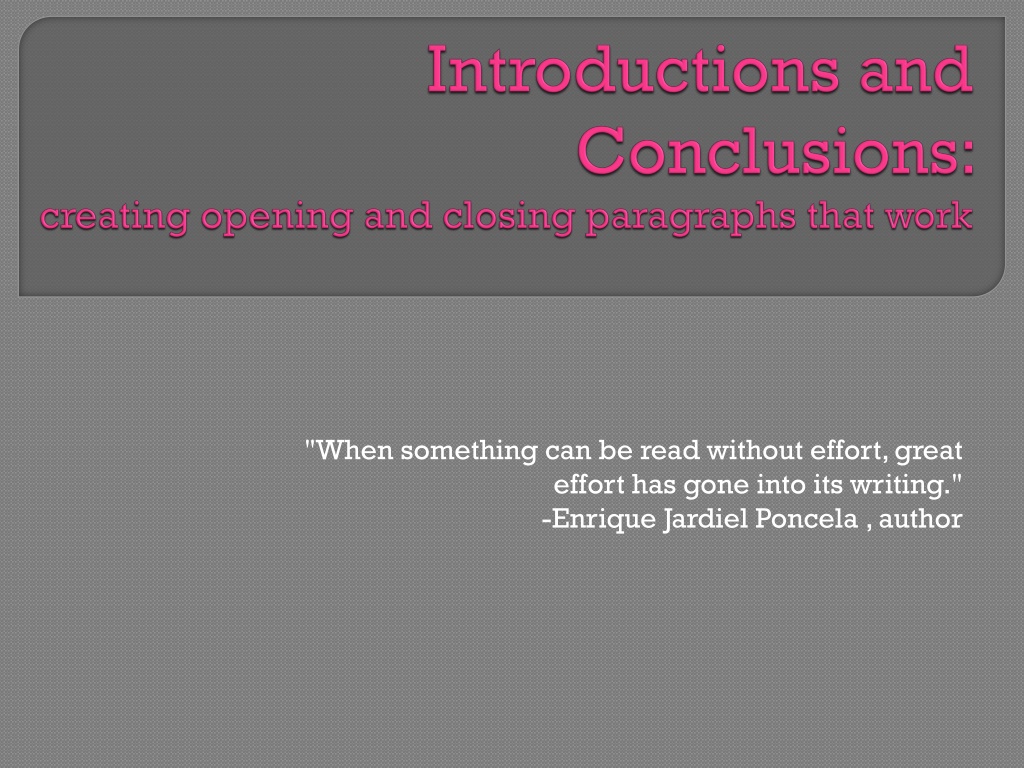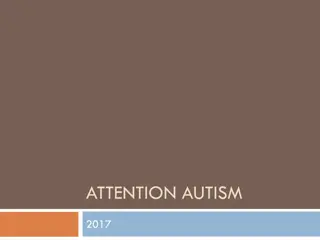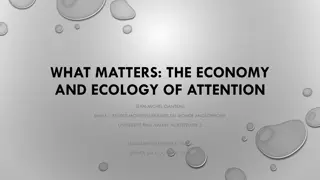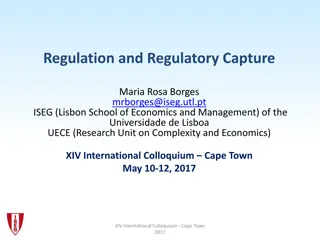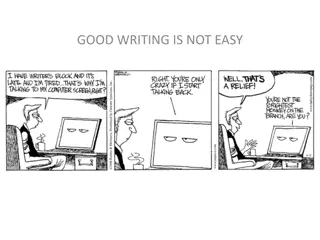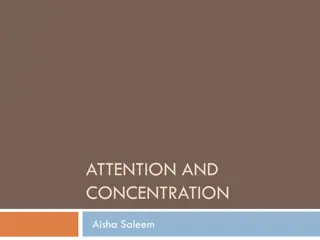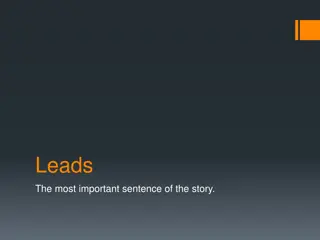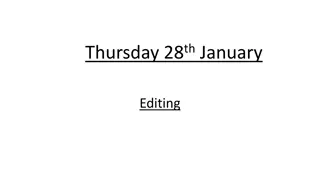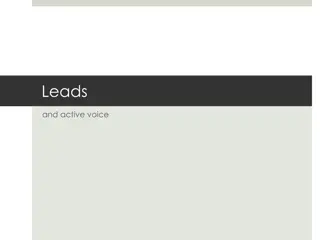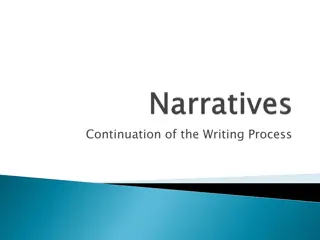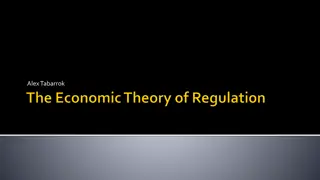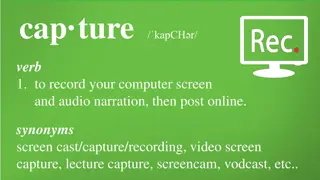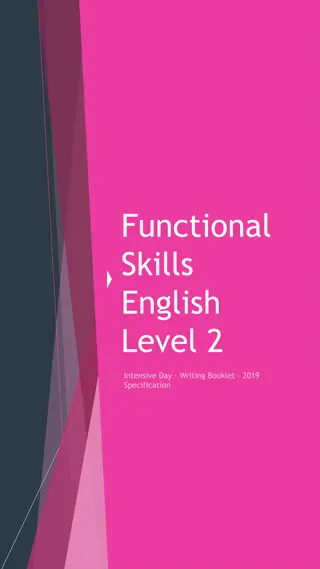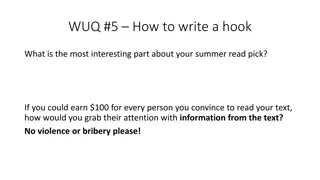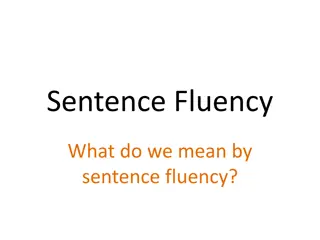Techniques to Capture Reader's Attention in Writing
Effective strategies for engaging readers at the beginning of a piece include arousing interest, stating the problem, and setting the tone and point of view. Using techniques like starting with descriptive details, anecdotes, startling facts, statistics, and rhetorical questions can captivate the audience and draw them into the content.
Download Presentation

Please find below an Image/Link to download the presentation.
The content on the website is provided AS IS for your information and personal use only. It may not be sold, licensed, or shared on other websites without obtaining consent from the author. Download presentation by click this link. If you encounter any issues during the download, it is possible that the publisher has removed the file from their server.
E N D
Presentation Transcript
"When something can be read without effort, great effort has gone into its writing." -Enrique Jardiel Poncela , author
What they should do Arouse reader s interest Offer statement of problem Establish topic, tone, and point of view Use a general-to-specific pattern
Begin with descriptive details She has no arms or hands, although the stump of her upper right arm extends just to her breast. Her left foot has been severed, and her face is badly scarred, with her nose torn at the tip, and her lower lip gouged out. Fortunately, her facial mutilations have been treated and are barely visible, except for minor scarring visible only up close. The scars, including a particularly large one between her shoulder blades, one that covers her shoulder, and covering the tip of her breast where her left nipple was torn out. From Visualizing the Disabled Body By Lennard Davis
Begin with an anecdote When I was studying Intermediate Italian in a study-abroad program in Italy, I wrote for our last assignment a brief essay Un Viagio a Venezia about a trip to Venice I had taken some weeks before. In my simple syntax and vocabulary, I explained the theme of my mini travel essay: despite the fact that we travelers four students, another professor and I had conflicting interests and itineraries, we managed to negotiate and compromise so each person could do or see one thing she wanted to. We managed to shop for jewelry, masks, and shoes, feed the pigeons on St. Marks Square, eat pizza by the Grand Canal, and watch the parade of boats in celebration of the Feast of the Redeemer. From Avoiding Appropriation By Carol Serverino
Begin with a startling fact or statistics Standing at the bar of an all-black VFW post in my hometown of Piedmont W. Va., I offered fived dollars to anyone who could tell me how may African- American professional athletes were at work today. There are 35 million African Americans, I said. Ten million! yelled one intrepid soul, too far into his cups. No way . . .more like 500,000, said another. You mean all professional sports, someone interjected, including golf and tennis, but not counting the brothers from Puerto Rico? Everyone laughed. Fifty thousand, minimum, was another guess. Here are the facts: There are 1200 black professional athletes in the U.S. There are 12 times more black lawyers than black athletes. There are 2 1/1 more black dentists than black athletes. There are 15 times more black doctors than black athletes. From Delusions of Grandeur By Henry Louis Gates Jr.
Begin with a rhetorical question What if you were about to present a PowerPoint lecture to a large undergraduate class, but found instead on your computer a series of sexually explicit ads and material from pornographic Web sites? That s essentially what happened recently to Mary Pederson, a nutrition-science professor at California Polytechnic State University at San Luis Obispo. That incident and the increasing presence of such imagery at Cal Poly have led to a novel, although undoubtedly predictable, struggle over computer content one that is quite likely to be replicated at countless campuses in the coming months. From What Limits Should Campus Networks Place on Pornography By Robert O Neill
More techniques Begin with quotation should be relevant and appropriate and you should say something about it. Begin with a figure of speech a metaphor or simile (With faces like road maps of their lives, the women lined up for their 5 lb. bags of rice) Begin with a strong, unexpected statement (The United States should prohibit dog and cat owners from living in cities. Period. End of discussion.) Begin with your thesis in the first sentence ( You do not have to be an academician in an ivory tower to think about religion and the destiny of humankind or about questions of right and wrong [Muller 676])
A statement of problem varies in length according to the type of writing from a paragraph in a short essay or two to several pages in a longer work like a thesis. If you are arguing for a solution to a problem, making a case for the cause of a problem, or researching a problem, you must: Clearly define the problem Offer the history of the problem Give the current status of the problem
Example The Bush Administration seems to be gunning to make history as the first great unilateralist government of the twenty-first century. But if the notion of going it alone appeals to the American public, it s partly because America routinely practices a less-noticed cultural unilateralism: If a work of art wasn t made in America, chances are Americans will never know about it. Consider: Approximately 92 percent of the US market in the year 2000 consisted of music from domestic acts. That makes America the most insular music market in the world except for Pakistan. The inward listening trend survives even though most of the big labels Sony, Universal and BMG are now controlled by non-US companies. This summer the bestseller lists in both France and Argentina included novels from the American author Paul Auster. (The top spot on France s list, however, was captured by our own Mary Higgins Clark.) From The Culture Blockade By James Ledbetter
Intelligence is not an absolute such as height that can be measured simply, largely because people have multiple intelligences rather than one single intelligence. In all, I have identified seven forms of intelligence. The two that are valued most highly in this society are linguistic and logical-mathematical intelligences. When people think of someone as smart, they are usually referring to those two, because individuals who possess linguistic and logical-mathematical abilities do well on tests that supposedly measure intelligence. But there are five other kinds of intelligence that are every bit a important: Spatial, musical, bodily-kinesthetic and two forms of personal intelligence interpersonal, knowing how to deal with others, and intrapersonal, knowledge of self. None of these ought to have a priority over others. From Human Intelligence Isn t What We Think It Is By Howard Gardner
We all negotiate among multiple identities, moving between public and private selves, living in present shadowed by the past, encountering periods in which time and circumstance converge to realign or even restructure our images of who we are. As increasing numbers of non-Anglo students pass through the doors of our writing centers, such knowledge of our own shapeshifting can help us begin if only begin to understand the social and linguistic challenges which inform their struggles with writing.
Conclusions should Complete a full discussion Restate the thesis Leave the reader with something to think about Use a specific-to-general pattern
Restate thesis You have to give up a lot of superficially attractive material benefits in order to preserve the quality of your life and your sanity (From Why I quit the Company by Tomoyuki Iwashita) Original introductory thesis could have been, Quality of life is more important than the sacrifice of benefits of a high salary. Restate main points Be brief and use different wording than was used earlier
Use emotion Ex. A subsidy of just $10 per child per year would guarantee that no more innocent infants have to die unnecessarily and no more families have to suffer the resulting grief. Give a powerful fact or detail Nearly 2500 babies a year die for lack of a simple and inexpensive supplement. Offer a compelling example If Baby Joan had received this simple medicine, she might have lived beyond three days old to ride a bicycle, discover a sense of humor, or to get a college degree. Use a quotation: must be relevant and should be well integrated. One player, seventeen-year-old Kevin Jarrett of Granbury, Texas, wakes up at 7 a.m. every day to hang out with friends he originally met in an Internet Relay Chat channel. It was a chance to blow them up, he says. It s become a community. For now, online gaming is a niche market catering to a devoted clientele. As beta testers, gamers can go on fifteen hour binges . . . (Hafner 75).
Refer back to the introduction Recommend a course of action (ex. Vote; contact congressperson; change the way you drive to save gas; recycle flourescent bulb), and tell the effects of this action. End with an appropriate anecdote. Use more than one of the above.
Do not include new information that needs development or justification earlier in the paper Do not continue to add empty words and sentences to fill out a word or page requirement Don t end with a life s lesson. Don t tell the reader what he or she should be thinking or believing or realizing. Ex. As you can see . . . . As I have proved . . . All of this will persuade you to . . .
Davis, Lennard J. Visualizing the Disabled Body. On World, Many Cultures 5thed. Eds. Stuart Hirschberg and Terry Hirschberg. New York: Pearson Longman, 2004. 180-187. Gardner, Howard. Human Intelligence Isn t What We Think it Is. Seeking Common Cause: Reading and Writing in Action. Eds. Diane Durkin and Lisa Gerrard. Madison: McGraw-Hill, 2006. 232-240. Gates Jr., Henry Louis. Delusions of Grandeur. The McGraw-Hill Reader 10thed. Ed. Gilbert H. Muller. Dubuque: McGraw-Hill, 2008. 504-513. Hafner, Katie. Log on and Shoot. The Wired Society. Ed. Carol Lea Clark. El Paso: Heinle and Heinle, 1999. 73-75. Ledbetter, James. The Culture Blockade. 75 Arguments: An Anthology. Ed. Alan Ainsworth. Dubuque: McGraw-Hill, 2008. 169-172. Muller, Gilbert H. Philosophy, Ethics, and Religion: What do We Believe? The McGraw-Hill Reader 10thed. Ed. Gilbert H. Muller. Dubuque: McGraw-Hill, 2008. 676-677. Severino, Carol. Avoiding Appropriation. ESL Writers: A Guide for Writing Center Tutors. Eds. Shanti Bruce and Ben Rafoth. Portsmouth: Boynton Cook,2004. 48-59.
